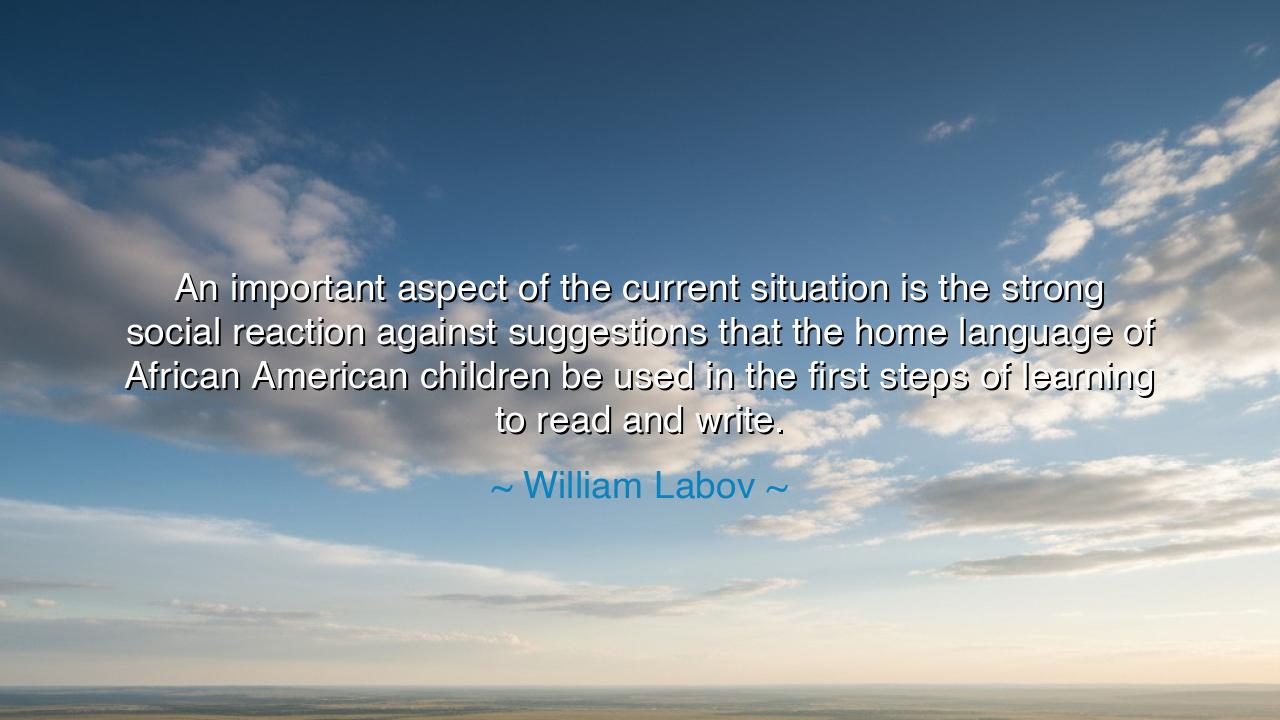
An important aspect of the current situation is the strong social
An important aspect of the current situation is the strong social reaction against suggestions that the home language of African American children be used in the first steps of learning to read and write.






In the words of William Labov, one of the great scholars of language and society, we encounter a truth both sorrowful and profound: “An important aspect of the current situation is the strong social reaction against suggestions that the home language of African American children be used in the first steps of learning to read and write.” At first glance, it may seem a mere observation about education, but beneath it flows a deeper current — the story of identity, prejudice, and the sacred power of language. Labov’s words remind us that the way a people speak is not just a means of communication, but the expression of their history, dignity, and soul. And when society rejects a child’s home language, it does more than silence words — it silences heritage.
To understand the origin of this thought, we must look to the struggles of African American Vernacular English, often dismissed by outsiders as “incorrect” or “broken.” Yet Labov, through decades of study, revealed that this language — born from centuries of pain and resilience — possesses its own structure, logic, and beauty. It is not an error, but a creation. When he spoke of the “strong social reaction” to using this home language in education, he exposed a deeper fear — the fear that acknowledging the worth of this speech would also acknowledge the worth of those who speak it. Thus, society resists, clinging to a false notion of linguistic purity, while children are forced to learn in a tongue that denies their roots.
The ancients, if they could hear Labov’s lament, would recognize this pattern well. For the destruction of a people’s language has always been the weapon of empire. When Rome conquered new lands, it imposed Latin upon the vanquished, believing that to speak the Roman tongue was to become civilized, and to abandon one’s native speech was to be reborn as a subject of the empire. Yet the philosophers of those lands — in Gaul, in Egypt, in Judea — mourned the loss of their old words, for they knew that language is the vessel of thought. To lose one’s language is to lose the rhythm of one’s ancestors. Labov’s warning, then, is ancient in its essence: when a society shames a child’s way of speaking, it trains them to be ashamed of who they are.
Consider the story of Zora Neale Hurston, the writer and anthropologist who celebrated the language of her people when others sought to erase it. She wrote in the dialects of the Black South, capturing the cadence of laughter, sorrow, and survival. Critics once scorned her for it, saying her writing was too colloquial, too “low.” Yet time proved her right — for through her words, future generations heard the music of authenticity, the unbroken line of culture that no oppression could destroy. Hurston lived what Labov taught: that to honor the language of the people is to honor the people themselves.
Labov’s statement also speaks to the moral blindness of societies that equate intelligence with conformity. A child who speaks differently is not deficient — they are bilingual between two worlds: the home and the institution, the heart and the rulebook. Yet when the school refuses to meet the child halfway, when it demands assimilation instead of understanding, it is the institution that fails. The “strong social reaction” that Labov describes is, in truth, a fear of equality — a resistance to the idea that all languages, and therefore all lives, are of equal worth. This reaction is not merely academic; it is spiritual. It reveals how deeply society fears what is different, even when that difference holds wisdom.
The lesson, then, is one of recognition and respect. If we wish to teach, we must first listen. If we wish to uplift, we must first understand. A teacher who honors a child’s home language does not lower standards; they build bridges. As the ancients said, “He who would build a tower must first lay stones where the people stand.” To educate without acknowledging the learner’s foundation is to build upon air. The wise teacher, like Labov, knows that to respect the child’s speech is to strengthen their voice — to teach them not only to read and write, but to stand unashamed before the world.
So, let us take Labov’s words as both warning and hope. Do not silence the languages of the heart. Every dialect, every accent, every cadence is a thread in the great tapestry of humanity. To tear one out is to weaken the whole. In every classroom, in every home, let us remember that the child’s first words carry the echo of centuries — of ancestors who survived, who adapted, who spoke life into being. To honor that language is to honor them. And in doing so, we affirm a truth older than any civilization: that the measure of a people’s greatness lies not in how they imitate others, but in how bravely they speak in their own voice.






AAdministratorAdministrator
Welcome, honored guests. Please leave a comment, we will respond soon